
Elite Participation in the Third Crusade
Seiten
2021
The Boydell Press (Verlag)
978-1-78327-578-6 (ISBN)
The Boydell Press (Verlag)
978-1-78327-578-6 (ISBN)
The motivations behind those who went on the Third Crusade examined through close investigation of their social networks.
The Third Crusade (1189-1192) was an attempt by Latin Christendom to reconquer the Holy Land, following the capture of Jerusalem by the Ayyubid sultan Saladin in 1187. Tens of thousands responded to a call for a crusade by Pope Gregory VIII and the efforts of his preachers at mass cross-taking ceremonies, rallying to the expedition's leaders - Frederick Barbarossa, Philip Augustus, and Richard the Lionheart.
This book analyses the communal and cultural factors that influenced nobles from north-western Europe who embarked on the Third Crusade, bringing out the motives, dynamics, and extent of their participation, and placing that participation in the broader social and geographical context of crusading and medieval life. It shows that significant numbers of them were themselves descended from crusaders, and that the majority of them travelled to the Levant in the company of friends, family, and neighbours, as well as through membership of a military household. It also highlights the role of key individuals - both male and female - who influenced the decision to undertake the crusade, and identifies the significant role played by particular religious institutions in the diffusion of crusading ideology.
The Third Crusade (1189-1192) was an attempt by Latin Christendom to reconquer the Holy Land, following the capture of Jerusalem by the Ayyubid sultan Saladin in 1187. Tens of thousands responded to a call for a crusade by Pope Gregory VIII and the efforts of his preachers at mass cross-taking ceremonies, rallying to the expedition's leaders - Frederick Barbarossa, Philip Augustus, and Richard the Lionheart.
This book analyses the communal and cultural factors that influenced nobles from north-western Europe who embarked on the Third Crusade, bringing out the motives, dynamics, and extent of their participation, and placing that participation in the broader social and geographical context of crusading and medieval life. It shows that significant numbers of them were themselves descended from crusaders, and that the majority of them travelled to the Levant in the company of friends, family, and neighbours, as well as through membership of a military household. It also highlights the role of key individuals - both male and female - who influenced the decision to undertake the crusade, and identifies the significant role played by particular religious institutions in the diffusion of crusading ideology.
STEPHEN BENNETT gained his PhD from Queen Mary, University of London; a former infantry officer, he is a graduate of both the Royal Military Academy Sandhurst (UK) and Escuela Superior de las Fuerzas Armadas (Spain).
Introduction
Faith and Finance:Religious Foundations, Ecclesiastical Leaders, and Fraternity
Family and Heritage:Lineage, Kinship, and Tradition
Locality and Fellowship:Territory, Trade, and Tournaments
The Household of King Richard I at the Time of the Third Crusade
Conclusion: Personal, Spiritual, and Communal Influences on Participation in the Third Crusade
Appendix A: The Noble Network: Crusaders from North-Western Europe, 1187-92
Appendix B: King Richard I's Household, 1189-92
Bibliography
Index
| Erscheinungsdatum | 09.03.2021 |
|---|---|
| Reihe/Serie | Warfare in History |
| Zusatzinfo | 6 line illus. |
| Verlagsort | Woodbridge |
| Sprache | englisch |
| Maße | 156 x 234 mm |
| Gewicht | 755 g |
| Themenwelt | Geisteswissenschaften ► Archäologie |
| Geschichte ► Allgemeine Geschichte ► Mittelalter | |
| Geschichte ► Teilgebiete der Geschichte ► Militärgeschichte | |
| ISBN-10 | 1-78327-578-2 / 1783275782 |
| ISBN-13 | 978-1-78327-578-6 / 9781783275786 |
| Zustand | Neuware |
| Haben Sie eine Frage zum Produkt? |
Mehr entdecken
aus dem Bereich
aus dem Bereich
eine neue Geschichte des Mittelalters
Buch | Hardcover (2023)
C.H.Beck (Verlag)
38,00 €


